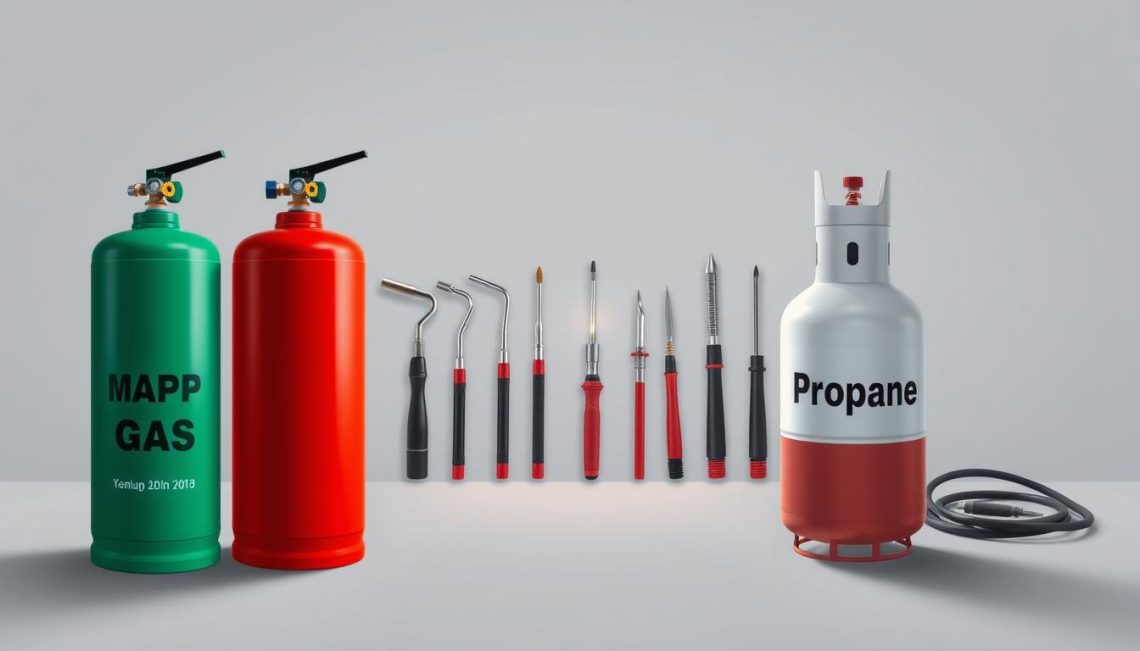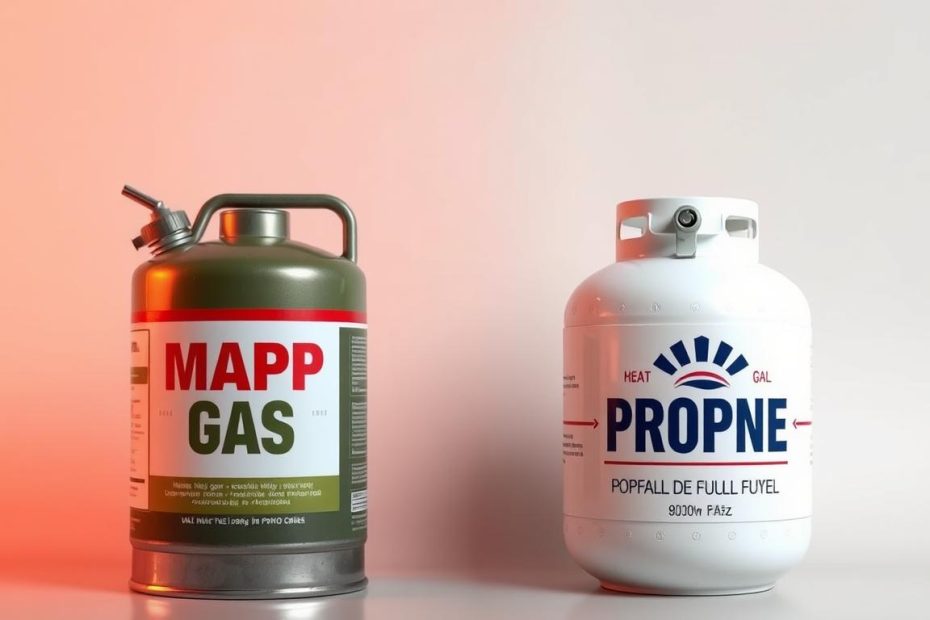When it comes to choosing the right fuel for your projects, the decision can significantly impact efficiency, safety, and cost. We’re here to explore the differences between two commonly used fuels: Mapp Gas and Propane.
Both fuels have their unique characteristics and applications. Understanding these differences is crucial for making an informed decision that suits your specific needs.
By comparing Mapp Gas and Propane across various aspects, we aim to provide clarity on which fuel is best suited for different tasks, ensuring you can work efficiently and safely.
Understanding Mapp Gas and Propane Basics
To make an informed decision between Mapp Gas and Propane, it’s essential to understand their fundamental differences. Both are used as fuels in various applications, but their properties and uses vary significantly.
What is Mapp Gas?
Mapp Gas is a fuel gas used primarily for soldering, brazing, and other high-temperature applications. It is known for its high flame temperature, making it ideal for tasks that require intense heat.
Composition and Properties
Mapp Gas is a mixture of methylacetylene and propadiene, along with other hydrocarbons. Its high flame temperature is due to its unique composition, which allows for more efficient combustion.
Common Uses
Common uses of Mapp Gas include soldering and brazing copper pipes, repairing automotive parts, and other applications that require high temperatures.
What is Propane?
Propane is a versatile fuel used for cooking, heating, and as a fuel for vehicles. It’s widely available and has a range of applications due to its clean-burning properties.
Composition and Properties
Propane is a byproduct of natural gas processing and crude oil refining. It is stored under pressure as a liquid and vaporizes when released.
Common Uses
Propane is commonly used for cooking on grills, heating homes, and powering vehicles. Its clean-burning properties make it an environmentally friendly option.
Key Differences at a Glance
| Characteristics | Mapp Gas | Propane |
|---|---|---|
| Primary Use | High-temperature applications like soldering and brazing | Cooking, heating, and vehicle fuel |
| Flame Temperature | Higher | Lower compared to Mapp Gas |
| Composition | Mixture of methylacetylene and propadiene | Propane gas |

Mapp Gas Vs Propane: Practical Applications Guide
Mapp Gas and Propane are both versatile fuels, but their differences in application can significantly impact your work. When deciding between them, it’s essential to consider the specific requirements of your project, including the temperature and heat output needed, the task at hand, and considerations of cost and safety.
Temperature and Heat Output Comparison
Mapp Gas burns at a higher temperature than Propane, making it more suitable for tasks that require intense heat, such as soldering and brazing. Propane, while still a high-temperature fuel, is often used for cooking and grilling, where the heat output is sufficient but not as extreme as Mapp Gas.
How to Choose for Specific Projects
Choosing between Mapp Gas and Propane depends on the project’s specifics. Let’s break down the considerations for different applications.
Soldering and Brazing
For soldering and brazing, Mapp Gas is often preferred due to its higher heat output, which allows for stronger joints and faster work.
Cooking and Grilling
Propane is commonly used for cooking and grilling because it provides a consistent, controllable heat that is ideal for these applications.
Heating Applications
For heating applications, Propane is a popular choice due to its efficiency and the widespread availability of Propane heaters.
“The choice between Mapp Gas and Propane should be guided by the specific needs of your project, including the required heat output and the task’s requirements.”
Cost Efficiency and Availability
Propane is generally more cost-efficient and widely available than Mapp Gas, making it a more accessible choice for many users. However, for tasks that require the high heat output of Mapp Gas, the additional cost may be justified.
Safety Procedures When Using Either Gas
Regardless of whether you choose Mapp Gas or Propane, safety procedures are paramount. Always ensure proper ventilation, use appropriate safety gear, and follow the manufacturer’s instructions for your specific gas and equipment.
Selecting the Right Gas for Your Needs
When deciding between Mapp Gas and Propane for your projects, consider the specific requirements and properties of each fuel. A thorough fuel comparison will help you make an informed decision that enhances efficiency, safety, and cost-effectiveness.
Mapp Gas is ideal for high-temperature applications, offering a higher heat output. In contrast, Propane is more versatile and widely available, making it suitable for various tasks. Understanding the differences between Mapp Gas and Propane enables you to choose the best gas for your specific needs.
We recommend evaluating your project’s demands and considering factors such as temperature requirements, cost, and availability. By doing so, you can select the most suitable gas, ensuring optimal results and minimizing potential risks.
